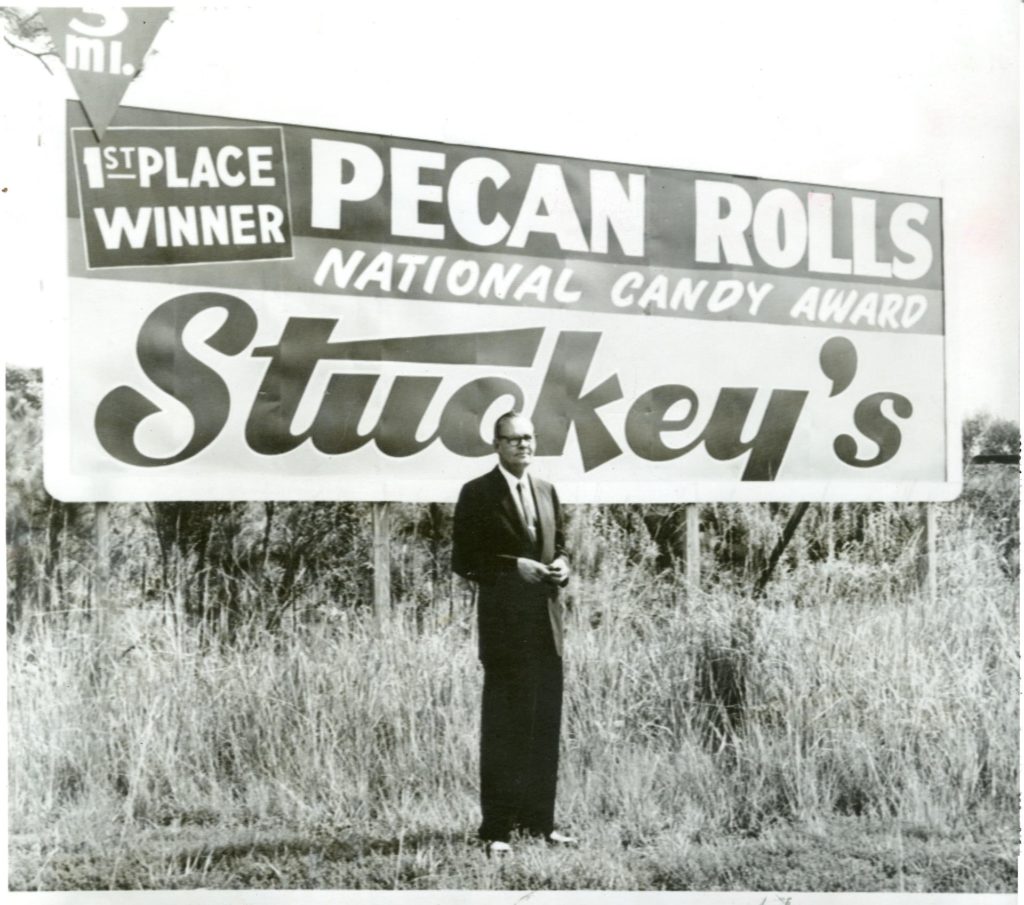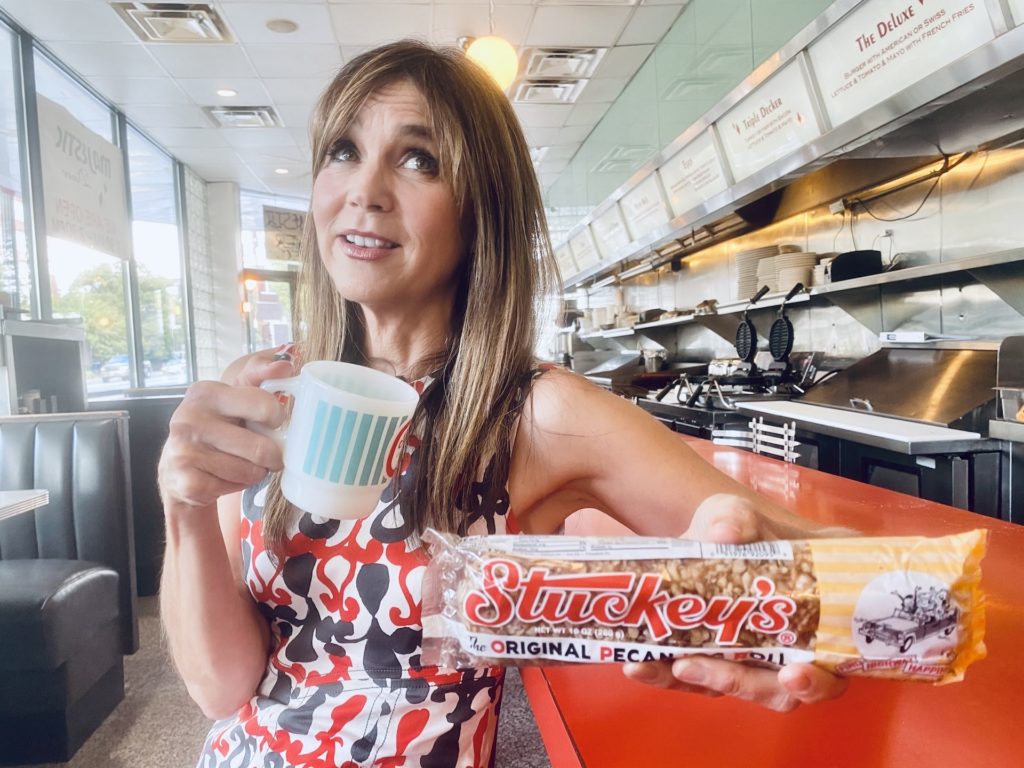Call her lawyer, chairman of the board, professor, author, public speaker, evenheiress. But the name that moves Stephanie Stuckey the most is granddaughter. This moniker drove Stuckey to invest everything she owned into reviving the waning Stuckey’s brand that her grandfather birthed in Georgia in the 1930s.
Williamson Sylvester Stuckey Jr. opened a roadside pecan business in Eastman, Georgia, in 1937. Needing an incentive to boost profits other than simply offering pecans, he and his wife, Ethel, put their heads together and added sugar. It was a delicious enticement to travelers to stop, purchase and enjoy their old-fashioned candy that was made fresh daily in the family kitchen. That first year brought in $4,500. And the rest, as they say, is history.
The Start of Something Special
The roll-out of the Stuckey’s brand created a roadside empire by the 1960s that catered to road trip travelers. More than 300 stores in 30 states, the buildings with the iconic teal blue roof offered a rest stop that included the iconic pecan log rolls, great food and crazy doo-dad souvenirs. However, by the 1970s, stores were declining, and when the patriarch died in 1977, a buy-out of the brand and the closing of stores across the country signaled the end of what most knew as the road-trip, road-side experience.

Fast-forward to 2019 when Stuckey received a phone call to purchase the dying brand. The woman who had spent decades building her professional career as a trial lawyer, state representative and head of sustainability for the City of Atlanta paused and considered. In time, she invested everything she had to bring her grandfather’s brand back to life.
“I don’t think it had fully sunk in, all that I was getting into,” she recalls about her expectations after the papers were signed. “I still hadn’t visited the stores. I still hadn’t gone to our distribution facility and see what little was left. Those first couple of days were just full of optimism. And I’m still optimistic, but in a more realistic way.”
The Eastman candy plant, along with the trucking company and billboard company, was gone. Third party manufacturers were producing the Stuckey’s products. Boxes of inventory had not moved in years, and with only three employees working full time, it was more important than ever for Stuckey to learn what she was up against. “So, I did what’s in my DNA because I’m a Stuckey, and I’m a road tripper,” she said. She and her 18-year-old son hit the road to visit the remaining Stuckey stores.
Road Trip of Rediscovery
During a road trip of ah-ha moments, including tears and a dashboard Jesus, Stuckey uncovered stores that had morphed into XXX Adult Superstores or had been left for nature to implode.
“I’ve learned that in life when you really are at rock bottom is where you find your firm foundation,” she said. “This was my rock bottom.” One of the locations begged for closer inspection; although the store looked horrible, she saw a man inside shopping, picking up Stuckey’s Pecan Log Rolls.
“Why are you here?” she asked him. “I remember what a special place it was as a kid,” he explained.
It was at that moment that she understood the brand’s most valuable currency, the emotional connection with its customers. “I had to figure out how to tap into it.”
The hardest element for Stuckey was the pivot.
“We are known as a roadside retail brand,” she said. “My grandfather built this chain of over 350 stores across the country, and sadly, most of the stores are gone. There’s only a handful that remain, and we don’t own them.” As much as Stuckey wanted to own and operate the remaining stores, it was financially an impossibility.
“So, we had to pivot,” she said. “We had to figure out how to revive this brand in a way that’s practical while remaining true to the brand.”
“I have to be radically present and face where we are now, where the brand is,” she continued. “What happened to us happens to a lot of brands. You lose your mojo. I want to defy the odds and say, ‘You know what, we can get our mojo back.’ It’s going to have to be in a different way.”
An integral part of Stuckey’s rebranding mission is her family’s original purpose: the pecan.

“This is what my family was put on this earth to do — to sell pecans,” she explained. “We are in the place where more pecans are grown (and the most delicious) than anywhere else.”
She and her business partners purchased a manufacturing facility in Wrens where pecan snacks and candies are now being made. Currently, there are more than 5,000 retailers across the United States that carry the products.
As the impetus and face of the brand, Stuckey saturates social media with her story and her product. True to her road trip love, she’s always seeking the “world’s largest” anything for a selfie, and customers purchasing pecan log rolls who have a childhood road trip memory that includes a stop at Stuckey’s. (Visit stuckeys.com for a growing 37-page guestbook which, since Stuckey’s purchase, has been flooded with memories.)
Staying true to the customer connections that put Stuckey’s on the map in the first place, Stuckey explained, “We are moving this brand forward in a way that’s respectful of the past, but we’re not living in it.”
Rewriting the Future
Remembering her grandfather’s mantra — “Every traveler is a friend”— guided her through the early stages of development. “He treated everyone with respect and like they belonged,” she said. “We’re all travelers through life, so whether you’re on a road trip, which is the niche he catered to, or just traveling through life, everyone should be treated like they’re a friend.”
With the world as her oyster, Stuckey aims high.
“I want Stuckey’s to be the go-to pecan snack brand in the world. We’re going to be synonymous with this delicious, tasty nut that is grown in our country, the only indigenous snack native to North America.”
As daunting as this journey appears to be, Stuckey is inspired by her grandfather’s legacy and the community of road trippers that relate to the brand. It begins with the pecan log rolls, but it culminates with the connection.
“Everyone has the power to rewrite their story,” she said. “Even when it looks like everything’s lost. Your brand is a dumpster fire. Your family business is six figures in the red. You used to have hundreds of stores across the country, and there’s ten left and they all look like crap. We can change the ending. You control your own narrative.”
Stuckey describes her journey in her new book, “Unstuck: Rebirth of an American Icon,” available on Amazon.com.
To find a list of Stuckey’s locations or to purchase their pecans online, visit stuckeys.com.